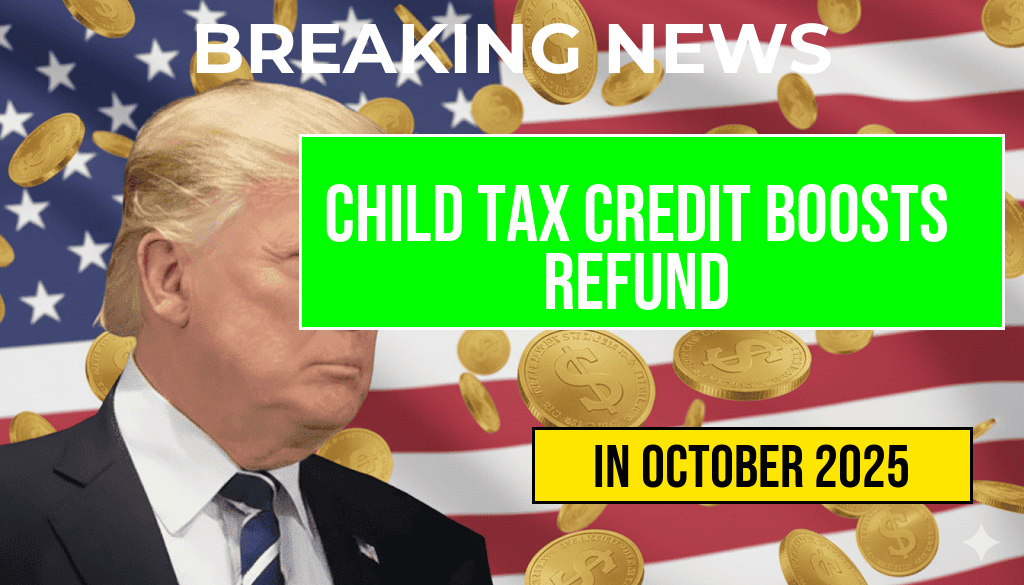The recent increase of $200 in the Child Tax Credit (CTC) has led to noticeable improvements in many taxpayers’ annual refunds. For families eligible for the credit, this adjustment can translate into an additional $200 being directly reflected in their tax return, potentially boosting refunds by a significant margin depending on their overall tax situation. This change, part of ongoing efforts to support working families, aims to alleviate financial pressures faced by parents and guardians. While the increase appears straightforward, its actual impact varies based on individual income levels, filing status, and other credits or deductions claimed. Taxpayers are encouraged to review the specifics of their eligibility and consult recent IRS guidance to fully understand how this adjustment may influence their refunds this year.
Understanding the Child Tax Credit Increase
What is the Child Tax Credit?
The Child Tax Credit is a federal benefit designed to provide financial support to families with qualifying children under the age of 17. It reduces the taxpayer’s liability dollar-for-dollar and can also be received as a refund if the credit exceeds the amount of taxes owed. Historically, the credit has undergone several expansions and modifications, most notably during the COVID-19 relief measures, which temporarily increased the amount and expanded eligibility.
Details of the Recent Increase
| Aspect | Previous Amount | Current Increase | New Total Credit |
|---|---|---|---|
| Maximum Credit per Child | $2,000 | $200 | $2,200 |
| Phase-Out Threshold | $75,000 (individuals), $150,000 (married filing jointly) | Unchanged | – |
This adjustment means families can now claim an additional $200 per qualifying child, effectively increasing their potential refund or lowering their tax liability if they owe taxes. The change aims to provide more immediate financial relief amid rising living costs and economic uncertainties.
Impact on Tax Refunds
How the Increase Affects Refund Calculations
For many families, the increase in the Child Tax Credit can translate into a tangible boost in their tax refunds. The specific amount added depends on factors like income level, number of qualifying children, and overall tax liability. For example, a family with two children qualifying for the full credit could see their refund increase by up to $400 solely based on this adjustment.
Example Scenario
| Family Profile | Number of Children | Previous Refund Contribution from CTC | Additional Refund Due to $200 Increase | Total Estimated Refund Increase |
|---|---|---|---|---|
| Married couple, $80,000 income | 2 | $4,000 | $400 | $4,400 |
| Single parent, $65,000 income | 1 | $2,000 | $200 | $2,200 |
It is worth emphasizing that the actual boost depends on the taxpayer’s overall tax situation. For some, the increase might fully or partially offset other liabilities or credits, while for others, it may be a marginal addition.
Eligibility and Filing Considerations
Who Qualifies?
- Children must be under age 17 at the end of the tax year.
- The parent or guardian must claim the child as a dependent.
- Adjusted gross income (AGI) must fall within specified limits, typically $75,000 for individuals and $150,000 for joint filers to receive the full credit.
- Taxpayers must have a valid Social Security number for each qualifying child.
Filing Tips
- Ensure all relevant forms, such as Schedule 8812, are completed to claim the increased credit.
- Review IRS guidance on recent updates, available on the official IRS website (irs.gov), to verify eligibility.
- Consider consulting a tax professional if your situation involves complex credits or income sources.
Policy Context and Future Outlook
The $200 increase in the Child Tax Credit reflects ongoing legislative efforts to support families amid economic challenges. While current adjustments are temporary, discussions continue in Congress regarding potential permanent enhancements to child benefits. For many families, this change underscores the importance of staying informed about tax law updates and ensuring proper claim procedures to maximize refunds.
For additional details on the Child Tax Credit and other federal benefits, the IRS provides comprehensive resources and updates through their official portal (IRS Child Tax Credit), which can help taxpayers navigate year-end filings and claim calculations.
Frequently Asked Questions
What is the Child Tax Credit Increase of $200?
The Child Tax Credit Increase refers to an additional $200 per qualifying child that can boost your tax refund for the year. This increase is designed to provide more financial support to families with children.
How does the $200 increase affect my overall tax refund?
The $200 increase in the Child Tax Credit can directly boost your refund by $X, depending on your individual tax situation and eligibility. It means you could receive more money back when you file your taxes.
Who qualifies for the increased Child Tax Credit?
To qualify, you must have a dependent child under age 17 who meets specific income and relationship criteria. The increase is aimed at families with qualifying children to help offset childcare and other related expenses.
When does the Child Tax Credit increase take effect?
The increase is applicable for tax years starting from 2023. Be sure to check the latest IRS updates and eligibility requirements for the current tax filing season.
How can I maximize my refund with the Child Tax Credit?
To maximize your refund, ensure you accurately claim all eligible children and take advantage of the $200 increase. Consulting with a tax professional or using reliable tax software can help you optimize your benefits.







